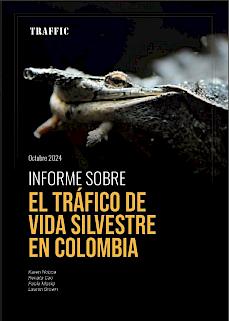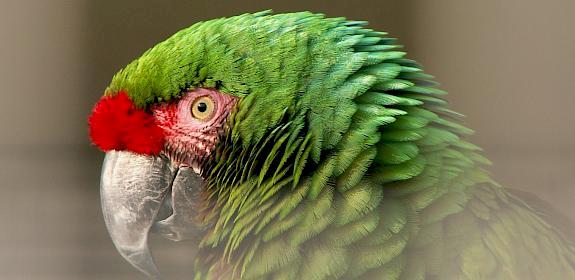
Pangolin scales seized by Malaysia Customs. Pangolins are the world's most trafficked mammal, a million have been poached in the last decade to satisfy Asian demand for their products © TRAFFIC
i
the conservation crisis of our time
Illegal wildlife trade is devastating wildlife species the world over, as poachers, traffickers and highly-organised criminal syndicates ruthlessly pursue profit at any cost to meet consumer demand.
The trafficking and unsustainable trade in wildlife commodities such as elephant ivory, rhino horn, pangolin scales, tiger bone, bear bile, and rosewood are causing unprecedented declines in some of the world's most charismatic, as well as some lesser-known, wildlife species. We're on the frontline working to ensure that illegal wildlife trade is identified, prevented, and prosecuted at every opportunity.
USD7–23 billion
2016 UN estimate of annual value of illegal wildlife trade
We work to tackle wildlife crime and illegal wildlife along the entire trade chain – from source to destination.
We work with enforcement agencies along supply chains to ensure they are equipped to detect, identify and prevent illegal trade. Below are some key actions we take to work towards a sustained reduction in poaching and illicit wildlife trade.
a selection of species threatened by illegal trade
pangolins
An estimated one million pangolins have been poached in the last decade, making them the most trafficked mammals in the world.
These shy creatures are poached in Asia and Africa for their scales and body parts, consumed for nourishment, a symbol of wealth or within traditional medicine. We're working to introduce measures to prevent the over-exploitation of these remarkable animals and turn the tide for pangolins.
Ground pangolin Smutsia temminckii, pangolins are predominantly poached for their scales and meat © Darren Pietersen / African Pangolin Working Group
i
African rhinos
Black and White Rhinos are among Africa's most iconic mega-fauna; gentle grazers and browsers who once spanned the entire continent.
After years of ruthless poaching by organised criminal syndicates for their keratin horn, both African species of rhino are now threatened with extinction in the wild and in desperate need of protection. We're working to both reduce demand for their horn among target consumers in Asia, and develop innovative approaches to combating poaching and the illegal trade in rhino horn.
An African Black Rhino Diceros bicornis, poached for their horn © Richard Edwards / WWF-UK
i
African Elephants
African Elephants are arguably the most well-known species to be heavily impacted by illegal trade and wildlife crime, given that approximately 90% have been decimated within the last century.
Global efforts to reverse this devastating onslaught on African Elephant populations have seen positive results, but demand for ivory still exists and illegal traders remain as resourceful and ruthless as ever. By closing domestic ivory markets which are contributing to poaching we can take significant steps towards ending a slaughter that has lasted for decades.
African Elephant Loxodonta africana, is mostly poached for its tusks © naturepl.com / Tony Heald / WWF
i
tigers
Tiger Panthera tigris populations have been devastated by poaching, illegal trade, human-wildlife conflict and habitat loss. Once common across Asian range states, these magnificent big cats are now estimated to number approximately 3,800 in the wild.
TRAFFIC monitors the illegal trade in tigers and found that an average of 110 individuals a year have entered the illegal trade chain in Asia over the last 16 years. As a result of such findings, Parties to CITES are now committed to phasing out tiger farming, which contributes to this trade and stimulates demand for their parts. Despite such positive moves, there's still a long way to go before wild tigers shed their Endangered status.
Seized Tiger skins in Chitwan National Park, Nepal © Mark Atkinson / WWF
i
tropical timber
Timber is the most widely traded wildlife commodity worldwide, a significant amount of which is harvested and traded illegally.
Regulating this trade to ensure timber is harvested and traded legally poses significant challenges. Of particular concern are the threats facing tropical timbers, such as various species of Rosewood Dalbergia spp. In some nations, including Madagascar and Cameroon, overexploitation of precious timber is occurring at alarming levels, with forest clearance decimating biodiversity and threatening the livelihoods of local people.
Rosewoods, such as this from Madagascar, are in high demand from markets in Asia © naturepl.com / Nick Garbutt / WWF
i
Abalone
South African Abalone Haliotis midae is the most heavily exported species in aquaculture anywhere in the world. 95% of South African Abalone exports go to Hong Kong, where it is it consumed as a delicacy or re-exported.
Recent TRAFFIC surveys have revealed that approximately 65% of South Africa's abalone exports are harvested illegally, and that organised criminal syndicates and even drug cartels are involved in the illegal trade that is harming both local communities and abalone populations.
South Afriucan Abalone Haliotis midae, consumed in Hong Kong and mainland China as a delicacy © Derek Keats
i
news and materials on illegal wildlife trade
Much of our work combating illegal trade is aimed at supporting governments and enforcement agencies to detect and prevent it. Explore some recent materials and news below.
Latest reports related to ILLEGAL WILDLIFE TRADE
TRAFFIC routinely monitors and analyses illegal trade, so the vast majority of our reports concern wildlife crime by proxy. Here are some recent examples specifically relevant to wildlife crime and poaching.
Visit our resource library for the full TRAFFIC publication archive.
achieving positive change
A major increase in awareness, political will, and ultimately action on the ground is needed to help ensure the future of species and products at risk through mismanagement and unsustainable harvesting.







